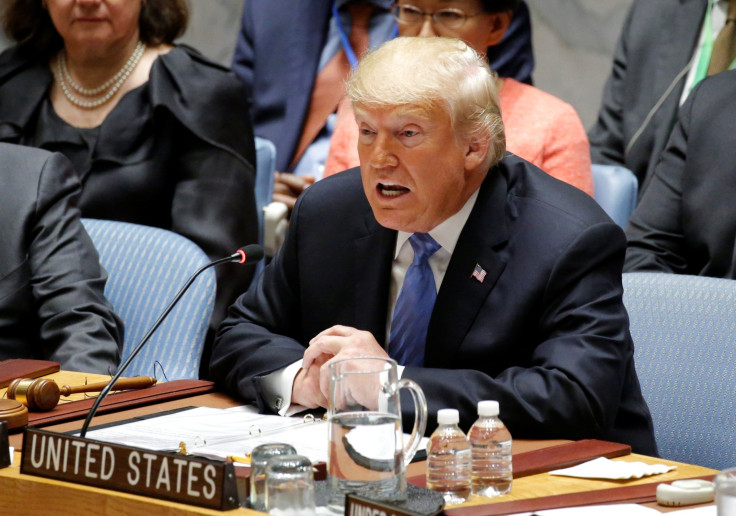Trump Accuses China Of 2018 Election Meddling; Beijing Rejects Charge
U.S. President Donald Trump on Wednesday accused China of seeking to meddle in the Nov. 6 U.S. congressional elections, saying Beijing did not want his Republican Party to do well because of his pugnacious stance on trade.
"China has been attempting to interfere in our upcoming 2018 election, coming up in November. Against my administration," Trump told a U.N. Security Council meeting whose ostensible subject was nonproliferation of weapons of mass destruction.
Chairing the Council for the first time, Trump made no reference to suspected Russian meddling in the 2016 U.S. election and provided no evidence for his allegation about China, which Beijing immediately rejected during the same meeting.
"We did not and will not interfere in any country's domestic affairs. We refuse to accept any unwarranted accusations against China," the Chinese government's top diplomat Wang Yi told the Council.
The United States and China are embroiled in a trade war, sparked by Trump's accusations that China has long sought to steal U.S. intellectual property, limit access to its own market and unfairly subsidize state-owned companies.
Later on Wednesday, Trump referred to a Chinese government-run media company's four-page supplement in the Sunday Des Moines Register promoting the mutual benefits of U.S.-China trade. The practice of foreign governments buying space in U.S. newspapers to promote trade is common and differs from a clandestine operation run by a national intelligence agency.
"China is actually placing propaganda ads in the Des Moines Register and other papers, made to look like news," Trump said in a Twitter post.
In a Des Moines Register article about the advertising supplement, Carol Hunter, executive editor of the newspaper, said the placement was not surprising.
"It’s not surprising that China Daily sought to place advertising with the Des Moines Register, because the Register is Iowa’s largest news organization and Iowa farmers are disproportionately affected by China’s tariffs," Hunter said.
A senior Trump administration official said China uses political, economic, commercial, military and information tools to influence U.S. public opinion and promote the interests of the Chinese government and Communist Party.

U.S. Vice President Mike Pence plans to make a speech next week detailing the allegations, said the official, who spoke to reporters on condition of anonymity, saying the U.S. government was working to declassify further information on the matter.
During an evening news conference, Trump described Chinese President Xi Jinping as a friend, prompting a reporter to ask how that could be the case given the allegations of meddling.
"Maybe he's not any more, I'll be honest with you," Trump replied.
IRAN: U.S. 'ABUSED' COUNCIL SESSION
Trump also used the Security Council session to defend the U.S. withdrawal in May from a 2015 international nuclear deal with Iran, hint at progress in U.S. efforts to curb North Korea's nuclear program, and to criticize Iran and Russia for supporting Syrian President Bashar al-Assad in the country's war, now in its eighth year.
"The Syrian regime's butchery is enabled by Russia and Iran," Trump said.
Iranian Foreign Minister Mohammad Javad Zarif responded in a Twitter post, saying the United States had "abused" the Council and is "further isolated."
Trump's allegation of Chinese election meddling came as a surprise during a formal meeting around the Security Council's horseshoe table that was expected to concentrate on the spread of nuclear, chemical and biological weapons.
"They do not want me or us to win because I am the first president ever to challenge China on trade and we are winning on trade, we are winning at every level. We don't want them to meddle or interfere in our upcoming election," said Trump, who is attending the U.N.'s annual gathering of world leaders.
Trump himself is not up for re-election until 2020 but November's voting will decide whether his Republican Party can keep control of the U.S. House of Representatives and the Senate. Some opinion polls show that the Democratic Party could make a strong showing, notably in the House.
In the latest salvo in the trade dispute, U.S. tariffs on $200 billion worth of Chinese goods and retaliatory taxes by Beijing on $60 billion worth of U.S. products kicked in on Monday, unnerving global financial markets.
During his roughly 10-minute speech, Trump made no reference to U.S. allegations against Russia concerning the election that brought him to power.
Speaking later to reporters, Trump said: "They (China) are trying to meddle in our elections. And we’re not going to let that happen, just as we’re not going to let that happen with Russia."
Trump's presidency has been dogged by the Russian issue, which led to an investigation by U.S. Special Counsel Robert Mueller into potential collusion between Moscow and the Trump campaign, which Trump rejects. Moscow denies interfering.
(Reporting by Yara Bayoumy, Steve Holland, David Lawder and Michelle Nichols; Writing by Arshad Mohammed; editing by James Dalgleish and Grant McCool)
-Reuters
© Copyright Thomson Reuters 2024. All rights reserved.




















